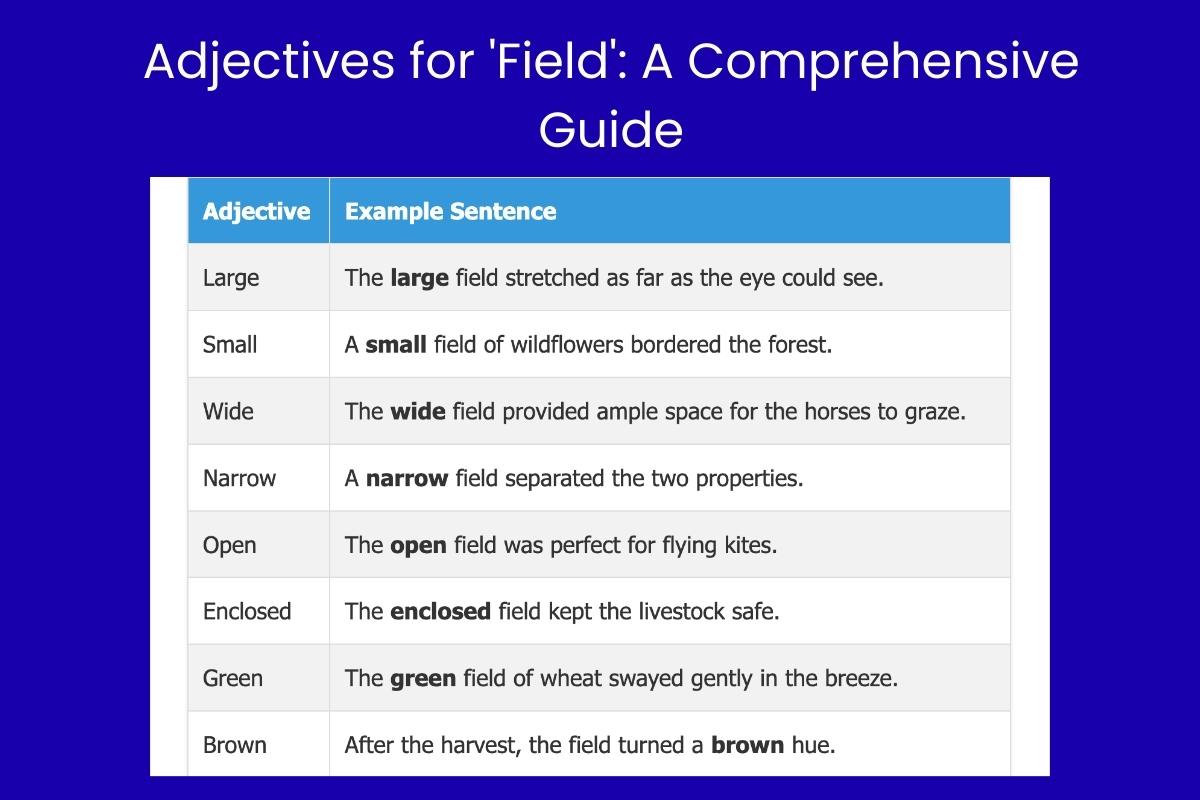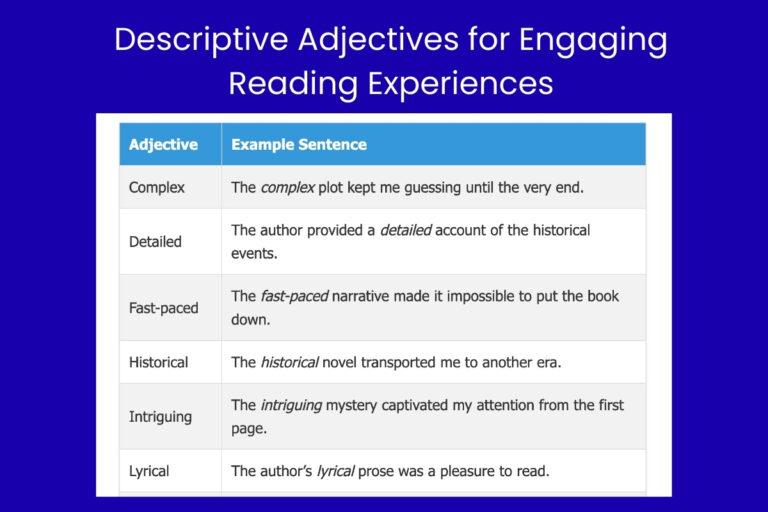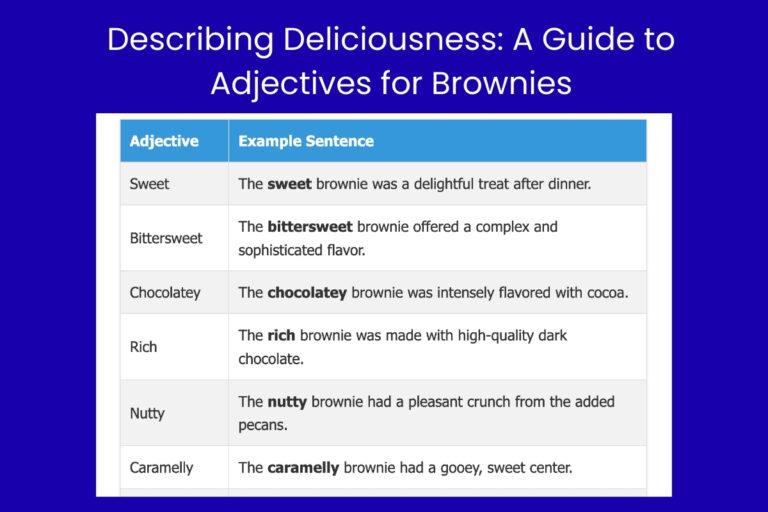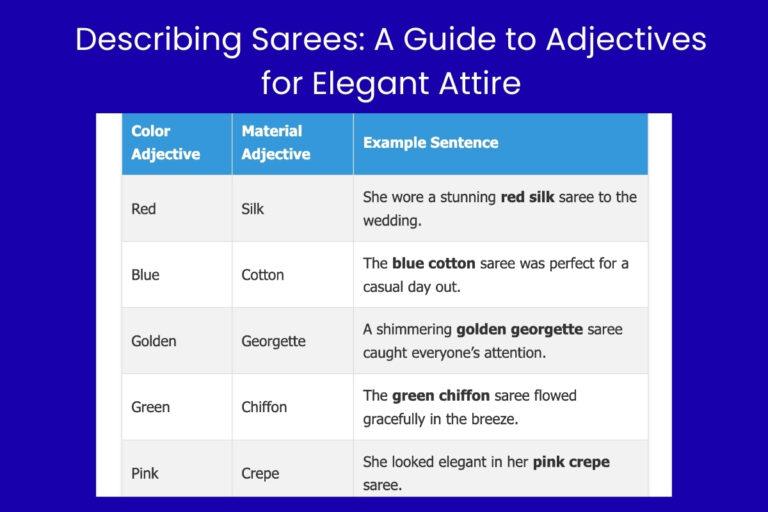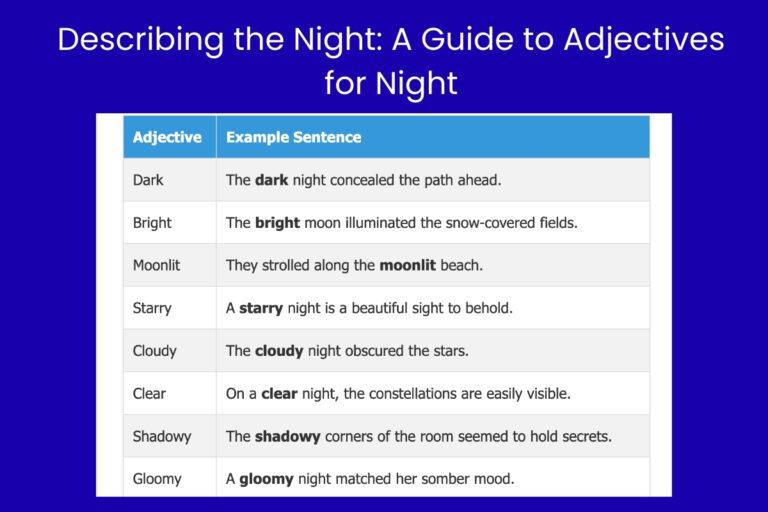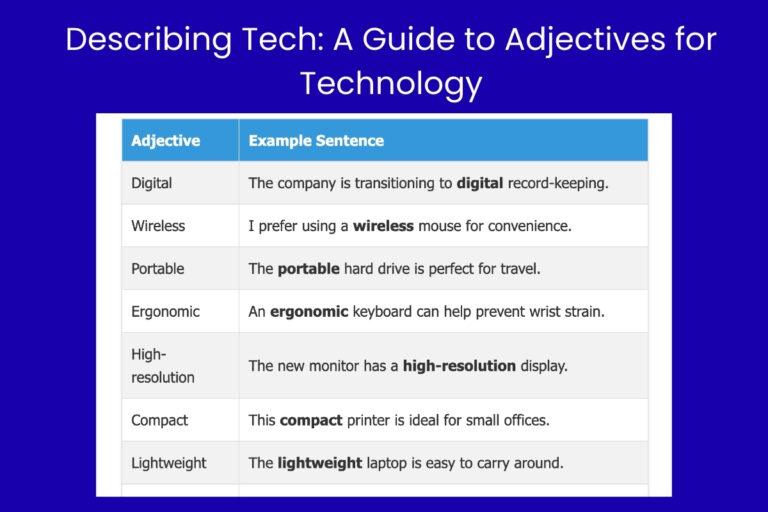Adjectives for ‘Field’: A Comprehensive Guide
Understanding the nuanced use of adjectives to describe a ‘field’ is crucial for precise and vivid communication. Whether you’re discussing agriculture, sports, science, or abstract concepts, the right adjective can dramatically alter the meaning and impact of your message. This article provides a thorough exploration of adjectives used to describe ‘field’ in various contexts, equipping you with the knowledge to enhance your writing and speaking skills. This guide is designed for English language learners, writers, students, and anyone seeking to expand their vocabulary and grammatical accuracy.
This comprehensive guide will cover definitions, structural breakdowns, types of adjectives, usage rules, common mistakes, practice exercises, advanced topics, and frequently asked questions. By the end of this article, you will have a solid understanding of how to effectively use adjectives to describe ‘field’ and improve your overall command of the English language.
Table of Contents
- Definition of ‘Field’ and Adjective Usage
- Structural Breakdown of Adjective Use
- Types and Categories of Adjectives for ‘Field’
- Examples of Adjectives for ‘Field’
- Usage Rules for Adjectives with ‘Field’
- Common Mistakes When Using Adjectives with ‘Field’
- Practice Exercises
- Advanced Topics
- Frequently Asked Questions
- Conclusion
Definition of ‘Field’ and Adjective Usage
The word “field” has multiple meanings, and the adjectives used to describe it vary depending on the intended sense. Broadly, a ‘field’ can refer to:
- A piece of land cleared of trees and usually enclosed.
- An area of open land, especially one planted with crops or pasture, typically unenclosed.
- A region or space in which a force or influence exists (e.g., magnetic field).
- A particular branch of study or sphere of activity or interest (e.g., the field of medicine).
An adjective is a word that modifies a noun or pronoun, providing more information about it. When used with “field,” adjectives help to specify the characteristics, qualities, or conditions of the field. For example, “a green field” describes the color of the field, while “a vast field” describes its size. The correct adjective choice is essential for clear and accurate communication.
Structural Breakdown of Adjective Use
The structure of adjective use with “field” is generally straightforward. Adjectives typically precede the noun they modify. The basic structure is:
Adjective + Field
For example:
- Fertile field
- Empty field
- Magnetic field
In some cases, multiple adjectives can be used to describe a field. When using multiple adjectives, they generally follow a specific order, although this order is more flexible in descriptive writing than in formal contexts. A common guideline for adjective order is:
Quantity – Opinion – Size – Age – Shape – Color – Origin – Material – Purpose + Noun
However, for simple descriptions of a field, the order is less critical. For example:
- A large, green field
- A beautiful, open field
It’s also possible to use adjectives after a linking verb (such as “is,” “are,” “was,” “were”) to describe the field. In this case, the structure is:
Field + Linking Verb + Adjective
For example:
- The field is vast.
- The field was empty.
- The field seems fertile.
Types and Categories of Adjectives for ‘Field’
Adjectives used to describe ‘field’ can be categorized based on the context in which the field is being discussed. Here are some common categories:
Physical Description
These adjectives describe the physical characteristics of the field, such as its size, shape, color, and condition.
- Large
- Small
- Wide
- Narrow
- Open
- Enclosed
- Green
- Brown
- Dry
- Wet
- Flat
- Hilly
- Rolling
- Barren
- Lush
- Dusty
- Windy
- Sunny
- Shadowy
- Desolate
Agricultural Context
These adjectives are used when discussing fields in an agricultural setting, focusing on aspects like fertility, cultivation, and yield.
- Fertile
- Barren
- Cultivated
- Uncultivated
- Productive
- Fallow
- Harvested
- Planted
- Sown
- Tilled
- Rich
- Poor
- Well-drained
- Waterlogged
- Bountiful
- Sparse
- Weedy
- Organic
- Conventional
- Irrigated
Sports Context
These adjectives describe fields used for sports and recreational activities, focusing on characteristics like the surface, size, and suitability for a particular sport.
- Grassy
- Turfed
- Artificial
- Well-maintained
- Muddy
- Sandy
- Smooth
- Uneven
- Level
- Sloping
- Regulation
- Designated
- Outfield
- Infield
- Home
- Visiting
- Practice
- Empty
- Crowded
- Floodlit
Scientific Context
These adjectives are used when referring to fields in a scientific or technical context, such as magnetic fields or force fields.
- Magnetic
- Electric
- Gravitational
- Electromagnetic
- Strong
- Weak
- Uniform
- Non-uniform
- Static
- Dynamic
- Quantum
- Scalar
- Vector
- External
- Internal
- Applied
- Generated
- Ambient
- Localized
- Simulated
Abstract Context
These adjectives describe “field” when used in an abstract sense, referring to a particular area of study, activity, or interest.
- Academic
- Scientific
- Medical
- Political
- Economic
- Technological
- Literary
- Artistic
- Educational
- Professional
- Competitive
- Emerging
- Established
- Growing
- Expanding
- Specialized
- Interdisciplinary
- Related
- Relevant
- Promising
Examples of Adjectives for ‘Field’
The following tables provide numerous examples of adjectives used with “field” in different contexts. Each table focuses on a specific category, illustrating how various adjectives can be used to describe the noun effectively.
Table 1: Physical Description of a Field
This table showcases adjectives that describe the physical characteristics of a field, such as its size, color, and topography. Understanding these adjectives helps in creating vivid and detailed descriptions.
| Adjective | Example Sentence |
|---|---|
| Large | The large field stretched as far as the eye could see. |
| Small | A small field of wildflowers bordered the forest. |
| Wide | The wide field provided ample space for the horses to graze. |
| Narrow | A narrow field separated the two properties. |
| Open | The open field was perfect for flying kites. |
| Enclosed | The enclosed field kept the livestock safe. |
| Green | The green field of wheat swayed gently in the breeze. |
| Brown | After the harvest, the field turned a brown hue. |
| Dry | The dry field cracked under the summer heat. |
| Wet | The wet field was difficult to traverse after the rain. |
| Flat | The flat field was ideal for building a runway. |
| Hilly | The hilly field presented a challenge for the farmers. |
| Rolling | The rolling field created a picturesque landscape. |
| Barren | The barren field yielded no crops that year. |
| Lush | The lush field was a vibrant oasis of green. |
| Dusty | The children played in the dusty field, kicking up clouds of dirt. |
| Windy | The windy field made it difficult to control the kite. |
| Sunny | We enjoyed a picnic in the sunny field. |
| Shadowy | The shadowy field offered a cool respite from the sun. |
| Desolate | The desolate field stretched out, lonely and bare. |
| Vast | The vast field of sunflowers faces the sun. |
| Empty | The empty field was waiting for the seeds to be planted. |
| Overgrown | The overgrown field had become a haven for wildlife. |
Table 2: Adjectives in an Agricultural Context
This table provides examples of adjectives used to describe a field in an agricultural setting. These adjectives focus on factors like fertility, cultivation, and the resulting yield.
| Adjective | Example Sentence |
|---|---|
| Fertile | The fertile field produced an abundant harvest. |
| Barren | The barren field was unsuitable for growing crops without significant intervention. |
| Cultivated | The cultivated field was meticulously prepared for planting. |
| Uncultivated | The uncultivated field lay fallow, allowing the soil to replenish. |
| Productive | The productive field consistently yielded high-quality crops. |
| Fallow | The fallow field rested, allowing the nutrients to return to the soil. |
| Harvested | The harvested field showed the remnants of the season’s bounty. |
| Planted | The planted field held the promise of a future harvest. |
| Sown | The sown field was carefully prepared for the seeds. |
| Tilled | The tilled field was ready to receive the seeds. |
| Rich | The rich field contained a high concentration of nutrients. |
| Poor | The poor field struggled to support plant life. |
| Well-drained | The well-drained field prevented water from logging and damaging the crops. |
| Waterlogged | The waterlogged field was unsuitable for most crops. |
| Bountiful | The bountiful field yielded a record-breaking harvest. |
| Sparse | The sparse field showed signs of nutrient deficiency. |
| Weedy | The weedy field required diligent maintenance to prevent the weeds from overtaking the crops. |
| Organic | The organic field was cultivated without the use of synthetic pesticides or fertilizers. |
| Conventional | The conventional field relied on modern farming techniques and chemical inputs. |
| Irrigated | The irrigated field received a controlled supply of water to ensure optimal growth. |
| Arable | The arable field was suitable for plowing and cultivation. |
| Unproductive | The unproductive field was a source of frustration for the farmer. |
| Abandoned | The abandoned field was slowly being reclaimed by nature. |
Table 3: Adjectives in a Sports Context
This table provides examples of adjectives used to describe a field in a sports context. These adjectives focus on aspects like the surface quality, suitability for specific sports, and overall condition.
| Adjective | Example Sentence |
|---|---|
| Grassy | The grassy field was perfect for a game of soccer. |
| Turfed | The turfed field provided a smooth and consistent playing surface. |
| Artificial | The artificial field allowed for year-round play, regardless of weather conditions. |
| Well-maintained | The well-maintained field was a pleasure to play on. |
| Muddy | The muddy field made the game challenging and messy. |
| Sandy | The sandy field was better suited for beach volleyball than soccer. |
| Smooth | The smooth field allowed for accurate ball movement. |
| Uneven | The uneven field made it difficult to dribble the ball. |
| Level | The level field ensured fair play for both teams. |
| Sloping | The sloping field gave one team a slight advantage in the first half. |
| Regulation | The regulation field met all the official standards for the sport. |
| Designated | The designated field was reserved for organized sports activities. |
| Outfield | The outfield was well-groomed and ready for the baseball game. |
| Infield | The infield was carefully raked to remove any imperfections. |
| Home | The home field advantage boosted the team’s confidence. |
| Visiting | The visiting team felt the pressure of playing on the opponent’s field. |
| Practice | The practice field was used for training and drills. |
| Empty | The empty field was silent after the game ended. |
| Crowded | The crowded field was filled with cheering fans. |
| Floodlit | The floodlit field allowed for evening games. |
| Well-lit | The well-lit field ensured good visibility for the players. |
| Adjacent | The adjacent field provided extra space for warm-up exercises. |
| Main | The championship game was held on the main field. |
Table 4: Adjectives in a Scientific Context
This table showcases adjectives used to describe ‘field’ in scientific contexts. These adjectives are crucial for precisely defining the characteristics of forces and influences in physics and other scientific disciplines.
| Adjective | Example Sentence |
|---|---|
| Magnetic | The magnetic field around the Earth protects us from solar radiation. |
| Electric | The electric field is generated by the presence of charged particles. |
| Gravitational | The gravitational field pulls objects towards each other. |
| Electromagnetic | The electromagnetic field is a combination of electric and magnetic fields. |
| Strong | The strong field exerted a significant force on the charged particle. |
| Weak | The weak field had little effect on the trajectory of the object. |
| Uniform | The uniform field provided a consistent force throughout the region. |
| Non-uniform | The non-uniform field varied in strength and direction. |
| Static | The static field remained constant over time. |
| Dynamic | The dynamic field changed rapidly in response to external factors. |
| Quantum | The quantum field describes the behavior of subatomic particles. |
| Scalar | The scalar field is defined by a single value at each point in space. |
| Vector | The vector field is defined by both magnitude and direction at each point in space. |
| External | The external field influenced the behavior of the system. |
| Internal | The internal field was generated within the object itself. |
| Applied | The applied field was used to manipulate the material’s properties. |
| Generated | The generated field was a result of the experimental setup. |
| Ambient | The ambient field was present in the surrounding environment. |
| Localized | The localized field was concentrated in a specific region. |
| Simulated | The simulated field helped researchers understand complex phenomena. |
| Gravitational | The satellite orbited within Earth’s gravitational field. |
| Induced | The changing magnetic field induced an electric field. |
| Resultant | The final force was determined using the resultant field. |
Table 5: Adjectives in an Abstract Context
This table presents adjectives used to describe ‘field’ in abstract contexts. These adjectives help define the nature and scope of a particular area of study, profession, or activity.
| Adjective | Example Sentence |
|---|---|
| Academic | The academic field of history requires extensive research and analysis. |
| Scientific | The scientific field is constantly evolving with new discoveries. |
| Medical | The medical field is dedicated to improving human health. |
| Political | The political field is often characterized by debate and compromise. |
| Economic | The economic field studies the production, distribution, and consumption of goods and services. |
| Technological | The technological field is rapidly advancing, creating new opportunities and challenges. |
| Literary | The literary field explores the power of language and storytelling. |
| Artistic | The artistic field encourages creativity and self-expression. |
| Educational | The educational field is focused on fostering learning and development. |
| Professional | The professional field requires specialized knowledge and skills. |
| Competitive | The competitive field of marketing demands innovative strategies. |
| Emerging | The emerging field of artificial intelligence is transforming industries. |
| Established | The established field of law provides a framework for justice and order. |
| Growing | The growing field of renewable energy offers solutions to environmental challenges. |
| Expanding | The expanding field of data science is creating new career opportunities. |
| Specialized | The specialized field of neurosurgery requires extensive training. |
| Interdisciplinary | The interdisciplinary field of environmental science combines knowledge from various disciplines. |
| Related | The related fields of physics and mathematics are essential for understanding the universe. |
| Relevant | The relevant field of study for a career in finance is economics. |
| Promising | The promising field of biotechnology holds great potential for medical advancements. |
| Dynamic | The dynamic field of software engineering is always changing. |
| Broad | The broad field of social sciences encompasses many different areas. |
| Narrow | She specialized in a narrow field of study within biochemistry. |
Usage Rules for Adjectives with ‘Field’
Using adjectives correctly with “field” involves understanding the context and choosing adjectives that accurately reflect the intended meaning. Here are some key usage rules:
- Adjective Placement: Adjectives generally precede the noun “field.” For example, “a fertile field,” not “a field fertile.”
- Multiple Adjectives: When using multiple adjectives, consider the order. While not always strict, a common guideline is: Quantity – Opinion – Size – Age – Shape – Color – Origin – Material – Purpose. For example, “a large, green, open field.”
- Linking Verbs: Adjectives can follow linking verbs (is, are, was, were, etc.) to describe the field. For example, “The field is vast.”
- Contextual Accuracy: Choose adjectives that are appropriate for the specific context (agricultural, sports, scientific, abstract). Using an adjective that doesn’t fit the context can lead to confusion.
- Descriptive Power: Select adjectives that provide meaningful and vivid descriptions. Avoid generic adjectives when more specific options are available.
- Avoiding Redundancy: Be careful not to use adjectives that repeat information already implied by the noun “field.” For example, avoid saying “a land field” as “field” already implies land.
- Hyphenation: Compound adjectives (two or more words acting as a single adjective) should be hyphenated when they precede the noun. For example, “a well-maintained field.” When they follow a linking verb, they are generally not hyphenated: “The field is well maintained.”
Common Mistakes When Using Adjectives with ‘Field’
Here are some common mistakes to avoid when using adjectives with “field”:
- Incorrect Adjective Placement: Placing the adjective after the noun.
- Incorrect: a field fertile
- Correct: a fertile field
- Inappropriate Adjective Choice: Using an adjective that doesn’t fit the context.
- Incorrect: a magnetic agricultural field (unless referring to a specific experiment)
- Correct: a fertile agricultural field
- Redundancy: Using adjectives that repeat information already implied.
- Incorrect: a land field
- Correct: a field
- Incorrect Hyphenation: Misusing hyphens with compound adjectives.
- Incorrect: a well maintained field
- Correct: a well-maintained field
- Overuse of Adjectives: Cluttering the sentence with too many adjectives.
- Incorrect: a large, green, open, vast, beautiful field
- Correct: a vast, open field
Practice Exercises
Test your knowledge of adjectives for “field” with the following exercises. Choose the most appropriate adjective to complete each sentence.
Exercise 1: Fill in the Blanks
Choose the best adjective from the options provided to complete each sentence.
| Question | Options | Answer |
|---|---|---|
| 1. The ______ field was perfect for flying kites. | (a) enclosed (b) open (c) cultivated | (b) open |
| 2. The ______ field yielded a record-breaking harvest. | (a) sparse (b) barren (c) bountiful | (c) bountiful |
| 3. The ______ field allowed for year-round play, regardless of the weather. | (a) grassy (b) artificial (c) muddy | (b) artificial |
| 4. The ______ field around the Earth protects us from solar radiation. | (a) electric (b) magnetic (c) gravitational | (b) magnetic |
| 5. The ______ field of medicine is dedicated to improving human health. | (a) political (b) economic (c) medical | (c) medical |
| 6. The ______ field was ready to receive the seeds. | (a) harvested (b) tilled (c) fallow | (b) tilled |
| 7. The ______ field was difficult to traverse after the rain. | (a) dry (b) wet (c) sunny | (b) wet |
| 8. The ______ field provides a smooth and consistent playing surface. | (a) turfed (b) sandy (c) uneven | (a) turfed |
| 9. The ______ field requires extensive research and analysis. | (a) academic (b) professional (c) competitive | (a) academic |
| 10. The ______ field prevented water from logging and damaging the crops. | (a) waterlogged (b) well-drained (c) barren | (b) well-drained |
Exercise 2: Correct the Mistakes
Identify and correct the mistakes in adjective usage in the following sentences.
| Question | Correct Answer |
|---|---|
| 1. The field fertile produced an abundant harvest. | The fertile field produced an abundant harvest. |
| 2. It was a field land, nothing more. | It was a field, nothing more. |
| 3. The field was maintained well. | The field was well-maintained. |
| 4. A field magnetic surrounds the earth. | A magnetic field surrounds the earth. |
| 5. The medicals field is constantly evolving. | The medical field is constantly evolving. |
| 6. It was an uncultivated agricultural field. | It was an uncultivated field. (Agricultural is implied) |
| 7. The field open was perfect for flying. | The open field was perfect for flying. |
| 8. This is a well lit sports field. | This is a well-lit sports field. |
| 9. The economics field is very interesting. | The economic field is very interesting. |
| 10. The field barren was a disappointment. | The barren field was a disappointment. |
Advanced Topics
For advanced learners, consider exploring these more complex aspects of adjective usage with “field”:
- Figurative Language: How adjectives can be used metaphorically or symbolically with “field” to convey deeper meanings.
- Historical Context: How the usage of adjectives with “field” has evolved over time in different fields of study or activities.
- Cross-Cultural Comparisons: How different languages use adjectives to describe concepts similar to “field” and the cultural nuances involved.
- The Role of Adjectives in Technical Writing: Understanding the importance of precision when using adjectives in scientific or technical contexts involving fields (e.g., magnetic fields, force fields).
Frequently Asked Questions
Here are some frequently asked questions about using adjectives with “field”:
- What is the correct order of multiple adjectives before “field”?
While the order isn’t always strict, a common guideline is: Quantity – Opinion – Size – Age – Shape – Color – Origin – Material – Purpose. For example, “a large, green, open field.”
- Can I use too many adjectives to describe a field?
Yes, using too many adjectives can clutter the sentence and make it difficult to read. Choose adjectives that provide meaningful and vivid descriptions without being redundant.
- What is a compound adjective, and how should it be used with “field”?
A compound adjective is two or more words acting as a single adjective. It should be hyphenated when it precedes the noun. For example, “a well-maintained field.” When it follows a linking verb, it is generally not hyphenated: “The field is well maintained.”
- How do I choose the right adjective for “field” in a scientific context?
In a scientific context, precision is crucial. Choose adjectives that accurately describe the specific characteristics of the field (e.g., magnetic, electric, strong, weak, uniform, non-uniform).
- What are some common mistakes to avoid when using adjectives with “field”?
Common mistakes include incorrect adjective placement, inappropriate adjective choice, redundancy, incorrect hyphenation, and overuse of adjectives.
- How can I improve my vocabulary of adjectives for “field”?
Read widely in different genres (literature, science, sports) and pay attention to the adjectives used to describe fields in various contexts. Use a thesaurus to find synonyms and expand your options.
- Is it okay to use subjective adjectives when describing a field?
Yes, subjective adjectives (e.g., beautiful, stunning, picturesque) can be used to express personal opinions or feelings about a field, especially in descriptive writing or informal contexts. However, in more formal or technical writing, it’s best to focus on objective, factual descriptions.
- How do adjectives change the connotation of the word “field”?
Adjectives significantly impact the connotation of “field.” For example, “barren field” evokes a sense of desolation and lack, while “lush field
” suggests abundance and fertility.
Conclusion
Mastering the use of adjectives with “field” is essential for clear, precise, and vivid communication. By understanding the different contexts in which “field” is used and choosing appropriate adjectives, you can significantly enhance your writing and speaking skills. This comprehensive guide has provided you with the knowledge and tools necessary to confidently and effectively use adjectives to describe “field” in any situation. Remember to practice regularly, pay attention to adjective usage in your reading, and continue to expand your vocabulary to further refine your skills. With consistent effort, you’ll be able to paint compelling and accurate pictures with your words, bringing your descriptions of fields to life.
